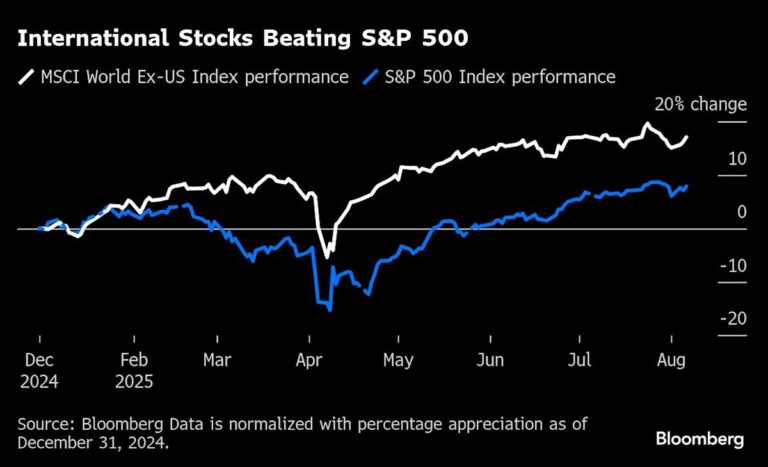(Bloomberg) — US President Donald Trump’s tariffs are giving international stocks a serious lift and at the same time helping to end the S&P 500 Index’s run of global dominance — at least for now.
Most Read from Bloomberg
International stock markets are on pace to outperform the broad US equities benchmark this year, the first time they’ve done that since 2022, and the first time in a rising market since 2009. Fears that tariffs and trade uncertainty will have an outsized impact on Corporate America’s earnings growth are the primary culprit.
The MSCI World Index excluding the US is clobbering the S&P 500 in 2025, jumping 18% thus far versus a more modest 7.8% gain in the S&P 500. You can see why in the individual performances. Mexico’s key stock market index is up 18% this year, Canada’s is up 12%, Germany’s 21%, Spain’s 26%, Brazil’s 14%, and the UK’s 11%.
It’s a sharp reversal from years of soaring gains for US equities, spurred most recently by mega-cap technology companies and the promise of artificial intelligence, and relatively sluggish performances by their global peers. This has left stocks in markets outside of the US relatively cheap.
“Sometimes the biggest gains come from the fixer-upper opportunities,” Craig Basinger, chief strategist at Purpose Investments Inc, said in an interview.
The valuation gap between US and international markets is “historically wide,” and investors are largely over-invested in the US and under-invested in other markets, according to Basinger. That trend has been reversing this year, and it could accelerate as Trump’s tariffs come into effect this month, while trading partners in Canada, Europe, Japan and elsewhere embark on investor-friendly reforms and boost domestic growth, he said.
“Rate of change matters in markets, and it would appear that international markets, generally speaking, are becoming a bit more investor friendly,” Basinger said. “America is still the gold standard, but if the gap narrows, so could the valuation gap.”
An “ultra-low growth” earnings outlook that has been baked into European and Japanese stocks for years also is starting to change, according to David Lambert, managing director, senior portfolio manager and head of European equities at RBC Global Asset Management.
Story continues
